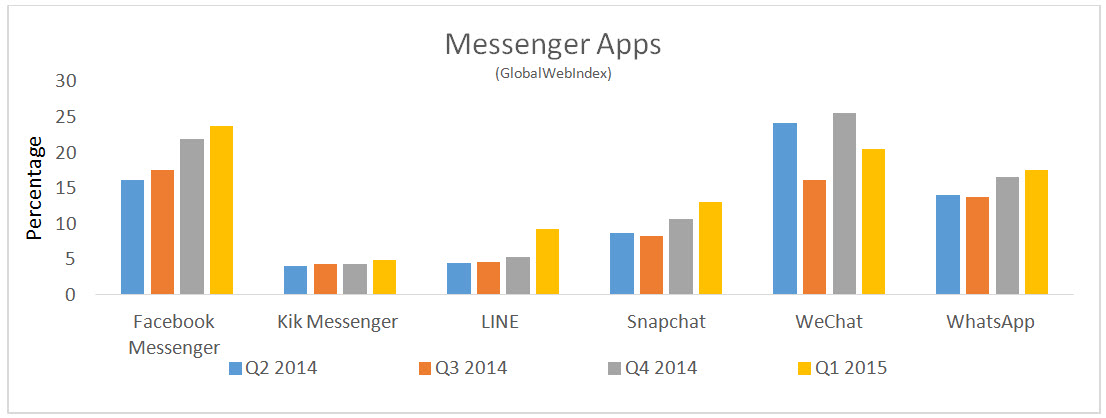Competitors would disagree, but Facebook’s decision to turn its messenger app into a social media platform is a development that should ensure its dominance for years to come – it’s a move that resolves the current limitations of its main platform, and recognises the growing popularity of its messenger offering and an understanding of where social in the West is heading.
The roots of Facebook’s announcement lie in China and the impact of their most popular social network – a messaging app – WeChat has had. With 500m active users, WeChat is a platform that is fully integrated into the social and commercial eco-system of Chinese society in a way that has not been replicated by Facebook, or any other platform in the West. The platform enables people to transfer money to each other, buy cinema tickets, book and pay for taxis and permits businesses’ to open stores inside WeChat, all in addition to its core function of talking to friends.
Facebook’s ambition to match this is combined with a shift in the dynamic of social in the West towards the privacy of messenger apps, precipitated by the growth of smartphones, in a way that poses a potential challenge to its dominance.
Whatsapp has 700m users globally, which although Facebook owns, operates independently, while mobile first messaging apps like Snapchat and Kik have been hailed as publishers new darlings, enabling them to reach a younger demographic that are popularly believed to be abandoning Facebook; Daily Mail, CNN, Vice and others, for example, post content direct to Snapchat’s Discover function whilst MTV intends to use its Kik account to direct traffic to its mobile site and deliver music videos of users choice.
The problem for Kik and Snapchat is that while user growth for the commercial free Whatsapp has soared these apps haven’t been able to move beyond its young userbase. Comscore found that user growth for Snapchat and Kik had stagnated amongst those 18+ in the US. Kik CEO Ted Livingston reacted to the news: “Hey internet are you listening? Messaging has peaked” noting that Kik and the others had failed to convince older generations to join- and that’s where he saw future growth.
Facebook Messenger, though, does have the broad demographic user base that helped establish WeChat into the phenomenon it is in China. When people were asked what mobile application/tablets they have used in the past month, globally 25% of 16-24 and 25- 34 year olds had used Facebook Messenger and it was still over 20% for 35- 44 year olds. Snapchat, conversely, was 8% for 16-24 year olds and then fell sharply thereafter to 4% and then 2% (GlobalWebIndex). Despite the hype of Kik and Snapchat (and it might surprise some of the brands who have flocked to them) Facebook messenger also had the highest share globally when the same question was put to just a teen audience (16-18 year olds) – so while teens might not actively be using Facebook as much, they are increasingly engaging with Facebook Messenger.

Apps like Kik might have been the first to enable users to talk to brands, but without Facebook’s messenger broad demographic appeal it lessens the impact and benefit for brands.
Given these foundations, Facebook’s announcement to make its messenger app a standalone platform is seen as such an exciting development; inspired by seeing how WeChat has gone beyond just texting, Messenger will become a hub, an immersive experience like WeChat. Adults will be able to check scores on ESPN and share sports clips, while kids could create custom gifs, or emojis;Facebook has also opened messenger to developers to build companion apps for creating and discovering content. Brands will now be able to access consumers through it, Messenger Business provides a more personal customer experience: it enables customers to talk to businesses; businesses’ can in turn issue them with a receipt and message the customer when the product has arrived. It also announced previously a feature where users will send each other money – and leaves open the potential to develop its commerce and mobile gaming side.
If it works, Facebook could be owning the social platform of tomorrow, providing a social and e-commerce experience on a level that we have yet to see in the West.





